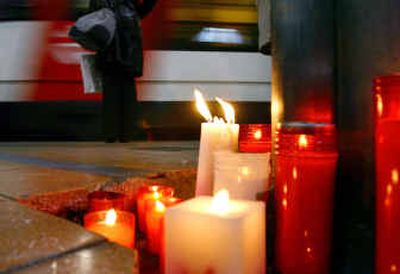Spain observes anniversary of tragedy

MADRID, Spain – With church bells and candles, silence and prayers, Spain on Friday offered solemn memorials to the victims of one of Europe’s deadliest terrorist attacks, one year after bombs detonated by Islamic militants ripped through commuter trains during a morning rush hour.
The violence on March 11, 2004, traumatized this country and opened a new phase of international terrorism in the heart of Europe, the impact of which is still reverberating throughout the continent.
Politically divided but eager to move beyond the tragedy, Spaniards marked the grim anniversary with restraint and dignity. At noon, traffic came to a halt, motorists stepped from their cars, trains made unscheduled stops, and workers left their offices, part of a silent pause in tribute to the dead and the survivors.
At the same time, King Juan Carlos I and Queen Sofia silently inaugurated a grove of olive and cypress trees in Madrid’s Retiro Park. There were 192 trees: 191 for the people killed in the bombings, and an additional one for a security agent killed later when seven suspects, holed up in a suburban apartment, blew themselves up as police closed in.
The royal family was joined by King Mohammed VI of Morocco, whose presence was meant to send a signal of solidarity and cooperation. Most of the suspects in the attacks were Moroccans.
At 7:37 a.m., the time last year when the first of 10 explosions tore through four crowded trains, more than 600 churches tolled their bells Friday in and around Madrid.
At the Atocha train station, where most of the victims were felled, hundreds of commuters shared the platform with journalists and television cameras present to record the moment. Lighted red candles were set up as a makeshift memorial, along with a handful of written messages, white carnations and a few photographs of the dead.
“I can’t shake the thought,” said Patricia Diaz Doran, 28, who was at the station a year ago and returned Friday. “Today is just another day, but I feel nervous. You can’t help but look around you.”
“I’m sorry for what happened,” said 41-year-old Saida Boussikouk, a Moroccan immigrant wearing a Muslim head scarf and taking in the scene as she rode an escalator en route to her job as a seamstress.
The attack “wasn’t right, but neither is it right to blame us all,” she said. “People push me in the subway when they didn’t before, I can tell the difference. … Fortunately, most people are still good with me. The problem is that more people than ever before don’t like seeing us here.”
Later, after dark, Spain’s Roman Catholic bishops led the royal family, authorities and others in a eulogy Mass at Madrid’s cathedral. The city’s largest mosque also offered prayers for the victims.
In addition to the nearly 200 people killed, a quarter of them immigrants from 16 countries, an estimated 1,800 people were injured, some seriously who are still struggling to recover.
Many victims’ groups chose not to participate in Friday’s ceremonies, saying they did not want to publicly relive their pain. But the government, which came to power in an upset electoral victory three days after the bombings, and others argued that the grief suffered is a national one, an indelible and collective trauma.